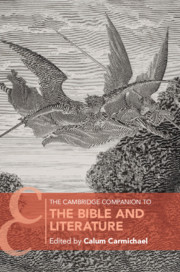Book contents
- The Cambridge Companion to the Bible and Literature
- Cambridge Companions to Religion
- The Cambridge Companion to the Bible and Literature
- Copyright page
- Contents
- Contributors
- Abbreviations
- Introduction
- 1 Literature in the Ancient Near East and the Bible
- 2 The Primary Narrative (Genesis through 2 Kings)
- 3 Reading Biblical Literature from a Legal and Political Perspective
- 4 Biblical Law and Literature
- 5 Kings, Prophets, and Judges
- 6 Prophetic Literature
- 7 Wisdom Literature
- 8 The Gospels
- 9 Paul’s Letters
- 10 Apocalyptic Literature
- 11 Shakespeare’s King Lear and the Bible
- 12 The Bible and John Milton’s Paradise Lost
- 13 The Bible, Shelley, and English Romanticism
- 14 Herman Melville and the Bible
- 15 The Song of Songs and Two Biblical Retellings
- Index
- Other Titles in the Series
- References
14 - Herman Melville and the Bible
Published online by Cambridge University Press: 13 March 2020
- The Cambridge Companion to the Bible and Literature
- Cambridge Companions to Religion
- The Cambridge Companion to the Bible and Literature
- Copyright page
- Contents
- Contributors
- Abbreviations
- Introduction
- 1 Literature in the Ancient Near East and the Bible
- 2 The Primary Narrative (Genesis through 2 Kings)
- 3 Reading Biblical Literature from a Legal and Political Perspective
- 4 Biblical Law and Literature
- 5 Kings, Prophets, and Judges
- 6 Prophetic Literature
- 7 Wisdom Literature
- 8 The Gospels
- 9 Paul’s Letters
- 10 Apocalyptic Literature
- 11 Shakespeare’s King Lear and the Bible
- 12 The Bible and John Milton’s Paradise Lost
- 13 The Bible, Shelley, and English Romanticism
- 14 Herman Melville and the Bible
- 15 The Song of Songs and Two Biblical Retellings
- Index
- Other Titles in the Series
- References
Summary
A volume on the Bible and literature affords an opportunity to explore the conjunction of these terms in relation to a writer whose great work Moby-Dick (1851) – the story of the hunting-down of a white whale by an obsessed sea captain – came to have, after Melville’s lifetime, a mythic role for his nation and for the Western world. Melville’s life (1819–91) spanned the nineteenth century and he was one of its outstanding thinkers. His work throughout is profoundly influenced by biblical texts. This essay, noting the influence of the Wisdom books of the Old Testament, highlights both their capacity to help Melville think through the problems of his age, and their influence on his understanding of the power of story and the capacities of language. After a brief account of Melville’s formative years, the essay considers a long passage from Moby-Dick for the complexity of its resonances with Ecclesiastes and Proverbs. A discussion of the role of Wisdom in Melville’s long dramatic poem Clarel follows, with emphasis on the book of Job. A late sketch, “Daniel Orme” offers, through the figure of Daniel, material for a final reflection on Melville’s role as thinker and visionary for his society.
Keywords
- Type
- Chapter
- Information
- The Cambridge Companion to the Bible and Literature , pp. 238 - 255Publisher: Cambridge University PressPrint publication year: 2020

